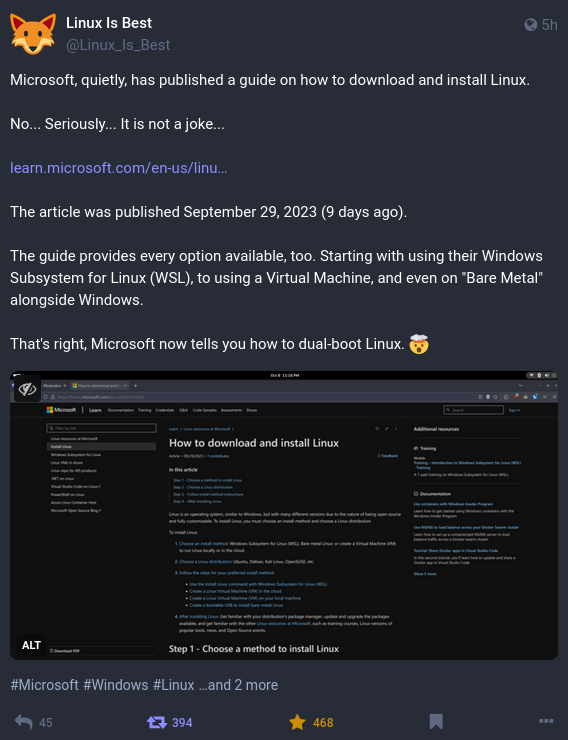I am sure they will start tightening screws on Linux one day too…
These can’t help themselves if they got market power.
I have one dream for Linux. I’m a huge OSS fan and I want to see it thrive.
I think Microsoft should partner with Oracle to make Oracle Linux 9 support all the Microsoft ecosystem. I want AD in Linux. I want Microsoft Word on Linux. Oracle Linux 9 is the obvious successor to RHEL and Microsoft has an opportunity here to build something great.
Lmao just kidding
I could see that with Ubuntu since they are already throwing money and dev time to support it. Also DoD is already putting out automated STIGs for it.
I was about 90% reading this going wtf is this guy on?
You actually can use Active directory with linux
It’s a huge portion and an important technology Linux or not - doesn’t hurt to learn somethin new especially when it’s helpful
You got me, I had my torch and pitchfork ready and my FOSS-themed chanting was growing louder…
Big step in the right direction for Microsoft :)
Even 10 years ago, this would’ve been unthinkable. Never would I have ever thought Microsoft would oublish a guide on instanjing Linux.
Pretty insane seeing the market dominant OS telling people how to install another OS lol
They’ve been moving this way for years. SQL server, .net core and powershell all run on linux and are a much bigger deal.
MS Office support when?
When windows for arm based on Linux and with backwards compatibility using wine and invisible VMs.
Technically Now. They have a web version, and their latest version of Outlook is basically their web app. If they release a linux binary it’ll just be a wrapper for the web version. It’s also a way for them to reach Chrome books.
Oh, that will explain why outlook runs like shit on my new computer.
Do you actually need to run MS Outlook specifically?
Not really fond of it. But so far it’s the best tool I’ve found to be used in a professional environment that supports Exchange.
It’s not that long ago when Steve Ballmer said “Linux is cancer”.
Oh wait, that was 22 years ago.
deleted by creator
why not? it’s not like there is any competition.
Microsoft is making more money off Linux with Azure than several red hats combined.Yes, but people find this interesting because historically, Microsoft was actively trying to destroy Linux (look up Halloween documents) and even said that Linux is cancer.
I was skeptical when Microsoft bought GitHub but since then, they have fully reversed course and even made a formal apology on their historical stance on Linux.
They’ve even made several additions to the kernel, mostly to support WSL but still.
The rumor is that Microsoft is working on their own distribution.
I mostly agree that what they are doing now is good for FOSS, but I don’t believe that they switched to the good side. Microsoft may support FOSS because they now profit from it, but you shouldn’t forget that they are still spying on their customers and doing other unethical stuff. As any big company, what they want is money and you shouldn’t believe that they are your friends or they want your good. (I’m not saying you think that, but many people idealize companies and forget that all they want is money)
Microsoft is a large, public corporation. They simply can’t be good. Profit as the single motive of their existence ensures that.
Exactly what I mean!
You mean this one?
Maybe?
My understanding is that it’s supposed to replace Windows, while providing native backwards compatibility for legacy apps.
I don’t know enough about mariner to say for sure.
Do they plan to just enhance wine for that?
It’s been 10 damn years. How long you people going to be surprised?
Some things just can’t be forgotten.
A lot changed after Satya Nadella took the helm. The modern .NET platform is really quite nice, and MS does a lot of
FOSSopen source work.Obviously it’s good to be sceptical, they’re a large corporation and all they want is money, they’re not our friends. They’re just not as draconian as they were in the 90s and the 00s.
FOSSopen sourceThere is no world in which crossing one of those terms out to replace it with the other is valid and not disinformation.
“Free Software” is defined by GNU. “Open Source” is defined by the Open Source Initiative. Those are the only valid definitions of those terms of art.
They may differ in tone and emphasis, but they are compatible: every piece of code that can validly be described as “Free Software” can also be described as “Open Source,” and vice-versa. The notion that there exists code which is “Open Source” but not “Free Software” is false, and anyone pretending that there is such a distinction (e.g. Microsoft’s past attempt at promoting “shared source”) is either misled himself or trying to mislead.
I’m not trying to accuse you of anything, but I just want to make sure we’re all clear on that point.
No, he doesn’t. That document supports my argument, not yours:
The two now describe almost the same category of software, but they stand for views based on fundamentally different values.
I’m a bit confused here.
I used to work for a company that published the source code for one of their products. I.e. made it publicly available.
But many of the build tools and build infrastructure were proprietary and internal (not published publicly.)
So I’d say that was open source but not free, since you can’t really build and run it.
Publishing source code is not sufficient to make something “Open Source.” Your company’s thing was better described as “proprietary with source code available.”
Usually FOSS is specifically copyleft licences like the GPL, which Microsoft don’t use. Their open-source stuff tends to be MIT.
I thought MIT is the “do whatever you want with my code but don’t blame me if it breaks something”-license. Am I misinformed?
While you’re correct, that’s funny because as a developer using a framework like dotNET, MIT gives YOU more freedom. At least for anything statically linked where the GPL code would end up as part of your binary and force you to GPL your own code I believe.
I find the distinction that dynamically linking GPL is fine but statically linking it is not to be so ridiculous. That’s obviously just an implementation detail. The only conceivable difference other than the pointless “technuchalley your program contains GPL code now as part of the file” is that you have to do dynamic linking, which is slightly slower. How does the fact that your work is dynamically linked vs statically linked make any difference to the people writing GPL libraries??
I think that’s for LGPL. For GLP any form of linking requires the code to be licensed under GPL, too. The dynamic linking except isn’t that bad of you think about it. It gives you the freedom to update or replace the library at any time. For security critical libs (TLS, GPG, …) that’s a big plus.
Dynamic linking let’s you use an already packaged library that its source you don’t touch.
Static linking means you have to show the source just in case you did some change.
That’s competely sensible if you ask me. Though there’s also nothing wrong with MITing your programs if you want to. By making the source available, you’ve already done plenty for the users.
The way I like to think of it is that non-copyleft licences are like giving everyone freedom by saying there are no laws - suddenly, you can do anything, and the government can’t stop you! However, other people can also do anything and the government can’t stop them, either, and that includes using a big net to catch other people and make them their slaves. The people caught in the nets aren’t going to feel very free anymore, and it’s not unreasonable to think that a lot of people will end up caught in nets.
Copyleft licences are like saying there are no laws except you’re not allowed to do anything that would restrict someone else’s freedom. In theory, that’s only going to inconvenience you if you were going to do something bad, and leaves most people much freer.
The idea is basically that you shouldn’t be able to restrict anyone else’s freedom to modify the software they use, and if you’re going to, you don’t get to base your software on things made by people who didn’t.
The GPL protects the freedom of the user primarily, not the developer.
Exactly. Debating which of copyleft or permissive licensing is “more free” is always the wrong question. The correct question is "freedom for whom?
At least for anything statically linked where the GPL code would end up as part of your binary and force you to GPL your own code I believe.
Anything more lax is fine, so you could also release your code under MIT license if you use GPL modules. Yes, it does force you to release your code but after all it’s a protection for the user. Furthermore, GPL does not mean your software has to be free of charge, you can still sell it as long as you attach the source code for the end user.
Huh? FSF counts the MIT license as free, though they call it the Expat license they list it as both Free and GPL compatible: https://www.gnu.org/licenses/license-list.html#Expat It is also listed as an opensource licence by the OSI.
Thus by definition MIT is a FOSS licence.
WSL has been integrated into Windows for a while now. The days you’re referring to are in the past.
The thing is, I don’t think a guide is really needed to install Linux. Most of it is pretty straight-forward. (The only tricky bit that comes to mind is making the USB that you’ve put your distro on bootable. That probably isn’t obvious; and it might not be obvious how to get your computer to boot from a USB anyway if you’ve never done it before.)
Anyway, the way I see it, Microsoft’s guide is more about how you can use Linux while still having Windows. If someone is searching for “how do I install Linux?” Microsoft would obviously prefer the answer to involve something that preserves Windows. First preference: WSL, second preference: Virtual Machine, third preference: dual-boot. And after that, you’re on your own.
The thing is, I don’t think a guide is really needed to install Linux. Most of it is pretty straight-forward. (The only tricky bit that comes to mind is making the USB that you’ve put your distro on bootable. That probably isn’t obvious; and it might not be obvious how to get your computer to boot from a USB anyway if you’ve never done it before.)
It’s been awhile since I installed a Linux distro…Have some of them improved guidance related to allocating disk space on install? I remember that was one of the parts that I wasn’t entirely confident I’d handled properly the last few times I did so. Something something swap, something /, and the like.
I did a Mint install a few weeks ago, and I’d say that if you want to preserve some existing OS (i.e. dual boot), then it isn’t super easy. You have to tell it what new partitions you want - and therefore you have to know something about what partitions you should have. The good news is that you don’t actually need any swap or home partition. You can just put it all on one partition - but I don’t think it’s obvious what to do.
On the other hand, if you aren’t trying to preserve something you already have, you can tell the installer to just go with all the defaults, and then you don’t have to know anything about it.
Note: Microsoft’s guide doesn’t mention any of that detail. It basically just says to follow the instructions of the installer.
Ou can dual-boot with the default options, but iirc if you want to choose how much of your Windows partition you want to use you have to do it manually. Haven’t done it in ages though so I could be wrong
Those are (made up) problems that might arise after you’ve already installed it; and I doubt Microsoft’s guide says much about them.
While I agree with you, the issues described are definitely not made up. Linux tends to remove proprietary drivers on every update and the open source drivers for Nvidia still fail with a lot of hardware.
this only happens if you install proprietary drivers manually and not through the software center (or package manager for the cli folks) on almost every given linux distro
this is why no sane linux user recommends installing download scripts from websites, you rely instead on your package manager to handle everythingI never installed any driver in any way other than the software center and it happened to me in every single update for several years until I finally bothered to search how to configure the update process to stop doing it (last month).
Multiple machines, distros, DEs, you name it. None of them ever not had this problem.
Umm… I really don’t know why you’re coming at me with some sarcastic anti-linux shit right now. All I said was that it was pretty easy to install. I didn’t say or imply that it was problem free. As for the problems being ‘made up’, I made a reasonable assumption that GRUB doesn’t care what day of the week it is - and so what you described was hypothetical only.
And after trying Linux inside windows and then inside a VM and realising it runs like shit, they’ll be convinced windows is better, but they’ve been deceived.
I don’t think a guide is really needed to install Linux
I had a guide and it was still a big learning curve. Linus had a guide and he still bricked his machine trying to install Steam. Imagine your parents or grandparents being told without context to mount an ISO to a USB and set up their BIOS - for 90% of people there is no way in hell they’re installing Linux without a guide unless they can double click an exe and have an install wizard do it for them.
I agree; but please take my comment in the context of Microsoft’s guide - which doesn’t tell users how to do any of things that you’ve mentioned. My point is that the underlying purpose of the guide is not so much about how to install linux, but how you might try linux while still keeping Windows.
deleted by creator
You have to install Windows first, then your Linux distro.
Doing that has solved all my problems with Windows being a douche
deleted by creator
windows hasn’t overwritten my uefi settings on major update in 3ish years
I prefer having Windows safely tucked away on a virtual machine where it can’t hurt anything.
You know that could be interpreted as a challenge.
I wouldn’t count on it… From Microsoft’s point of view, dual booting works as long as you install Windows first - which probably suits them just fine.
I personally haven’t seen windows do that in many many years (last time I saw it happen was with windows XP, though I haven’t ran dual-boot system with every windows since then, just some).
In my dual-Linux setup though, one keeps trying to get over the other in every minor update.
deleted by creator
Doubt it
I think Linux community is holding on hate and toxicity towards Microsoft and their software, you can even see it in comments to this post. Like lemmy is holding on hate towards Reddit (there is even Reddit community to share your anger). So if Microsoft somehow proves that they doesn’t deserve hate they are getting, Linux community will be shaved.
wat? it’s a corporation, the hate is 100% warranted.
just because google’s eclipsed them to become the current worst thing ever, it doesnt mean MS isnt a blood sucking monster. if they were in the right position, they’d still be fucking us over.
…doesn’t mean MS isnt a blood sucking monster.
Bill Gates hatred of mosquitos finally clicked for me. He’s getting rid of the competition!
Microsoft’s entire business success was taking someone else’s work, building on it, then once they found any level of success they used anti-competitive business practices to become a mega corp and stay that way. The founder is still alive and profiting from the company.
There is no point in our lifetimes when MS won’t deserve hate for everything they have done, even if there is a begrudging acceptance that they have made changes that make them appear more welcoming to competition.
Youre talking about a huge megacorporation like a person. Oh no poor billy is getting bullied by a few nerds who use a different operating system.
So if Microsoft somehow proves that they doesn’t deserve hate they are getting
Ok i know you’re not being serious but my mind reels. What would that look like? There would have to be Clancy novel levels of shit going on
Which is one of the things that people seem to forget about with Microsoft when they think that them pushing Linux is some nefarious plot to kill Linux and get everyone on Windows. At this point, it’s like 12% of their total revenue. Not insignificant, but they’re likely going to see far more growth pushing products related to Azure, which most instances are going to be running some sort of Linux VMs.
Microsoft saw the writing on the wall a while ago, and knows that the desktop and even embedded environment is a small slice of the computing pie. They would obviously still prefer to own 100% of that, but they also saw that there’s a finite number of users and devices that’ll use Windows, while there’s effectively an infinite number of things that people can put on their cloud services. Even if it has to be a “competing” OS, they’re making a shitton of money regardless.
Can’t wait for this page to become a Rickroll for Linux community giving technical advice.
Whenever someone asks “what distro should I choose?”, link them to this:
https://learn.microsoft.com/en-us/linux/install#step-2---choose-a-linux-distributionLinux.org page of popular distros needs an update.
It’s funny that they mention Kali but nothing from RedHat
They mention redhat under the business/enterprise section
I’m beginning to like Microsoft more and more when I can’t use FOSS. GitHub, typescript and vs code are all great. Also it’s getting easy enough to de-google and replace any remaining dependency with the MS suite, which might not be any better but at least google is no longer a monolithic monopoly.
Just suggesting;
- Codeberg instead of Github
- VScodium instead of VScode
Does codium support the same GitHub integrations as VS code? I’m quite enjoying GitHub copilot and Actions integrations, among others.
Yes you can get Copilot running, although last time I did it required a few extra steps. The guide I was using was on Github I believe. I would try to find it for you, but busy rn 🙃
why codeberg instead of github
Yupp, and open source of course ✨
I’d go with gitlab instead of codeberg if I had the choice. However the same kinda problem exists as social media with critical mass. The mass is with GitHub and until activitypub federation with gitlab becomes feasible you are cutting out contributors, reviewers, etc by not using GitHub.
It’s not super difficult to host your own gitlab instance tbh.
So Linux is an end state utopia of software? Never thought Ballmer was based
I mean, to be fair, that article is over 20 years old by now.
After 20 years, lots of people grow out of their mistakes and become wiser.
Ballmer is not one of these people.
but the Linux crowd, in the world of Prez Steve, are communists.
But it’s kinda true though, at least in spirit? Red Hat obviously not though.
I kind of hoped Redhat was going to reverse uno IBM there for a bit, fuck was I wrong…
I know, that’s why I am totally cold to any of their “opensource” contribution. Most are not useful to non Windows system, Microsoft is getting more than doing.
- Vscode? really
- .Net Core? who cares?
- Github? hem
- WSL ? who cares? Better using a VM
- Naturally, zero contribution to Proton
Even the laptop surface lineup is reverse engineered by the community.
wsl is better, faster and much more convenient than a vm for most tasks. If you think a vm is a replacement for wsl, you don’t know what you’re talking about. (it targets a completely different usecases and audience).
vscode is a… decent open source* code editor (official builds are licensed under EULA and packaged with proprietary components, but there’s also codeoss/codium) with an enormous plugin ecosystem (with an unofficial open source backend available)
It works great for (Rust) development for me and a lot of other people.
I don’t feel like learning vim, and there aren’t many other (mature) alternatives..net core is a good thing; it brings the most important parts of the .net ecosystem (that some people are used to) to Linux, mac and other platforms.
Extra choice and software compatability is always great.Github… yeah it’s… sketchy
but it’s still the de-facto standard, and while it’s completely proprietary, it’s main usecase is public projects. (it’s safe to assume that most private repos are hosted on private git instances)
Also MS is doing a decent job at keeping it “not shitty” (unlike windows; i actually agree with most changes to github) and all improvements made to it improve life for millions of open source developers.Also Microsoft mostly contributes to projects they’re actually using (open source libraries, linux, etc), so why would they ever contribute to Wine or Proton?
It doesn’t affect them or their software in any way.(btw I’m not a native English speaker so please forgive my mistakes)
This is a thing about huge companies. They can only ignore alternatives at their own peril.
The Windows team probably prefers you don’t ever install Linux even though they wised up and created WSL (so they don’t lose developers to Linux desktop the way they lost creative designers to Mac).
The other teams? VSCode, Office 365, Azure, GitHub, Bing, Skype, etc wisely DGAF what your OS is - just that it’s supported so you can use it.
WSL has actually been part of Windows in one form or the other since the very first NT, initially because US state contracts required a “supports POSIX” checkbox and the implemented just enough to be able to tick that (and, consequently, it sucked), it’s also why NTFS has a POSIX mode for filenames. It was definitely a very unloved stepchild during the Gates/Ballmer years, back when MS was pushing Windows servers. Nowadays they have their own Linux distro to do server stuff, the whole company strategy shifted, Windows isn’t an anchor point, any more, their corporate support contracts are. In a sense they’re trying to be SAP for small companies (for SAP values of “small”. MS itself is a small company on the SAP scale). That is cloud-supported, which has some (but not gigantic) synergy with their gaming arm.
They just realized that an Azure subscription will generate far more revenue (as in “several orders of magnitude” more) than selling licenses or even OS subscriptions to final users. This was by design. The current CEO doesn’t care what happens to Windows as long as it supports his quest for infinite profits.
ironic, a FOSS kernel killing windows in the name of profit
But depending on the software (looking at you Teams) they GAF which browser you use.
teams is just a web page, the app is electron
That is not better.
Just make sure you host every thing you develop on azure and we gucci! Oh and get Office 365!
Aren’t Office Suite apps not even released for Linux? I feel like I remember having to use the web based apps, and not by choice
That’s why the guide teach you how to dual boot, not entirely replacing windows partition with Linux.
































